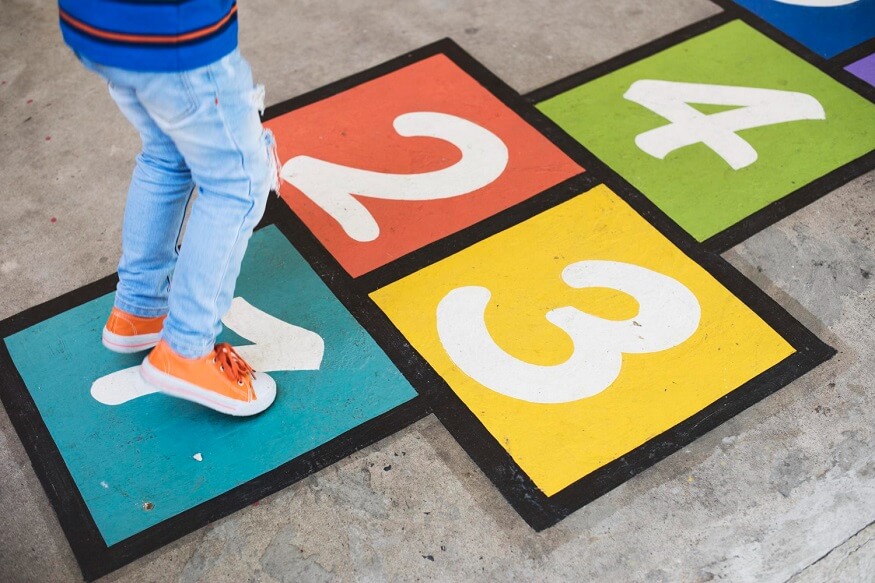Engaging children in outdoor maths activity not only makes learning fun but also helps them apply mathematical concepts in real-life scenarios. Here, we present some exciting outdoor maths games along with their procedures to enhance your child’s mathematical skills while enjoying the fun outdoor games.
Outdoor Math Activity for Kids:
1. Outdoor Number Games : Hide numbered cards in your outdoor area. Give your child a list of numbers to find in order. They must locate and match the numbers correctly.
2. Maths Scavenger Hunt: Hide objects representing maths concepts (e.g., leaves for addition, stones for multiplication). Provide clues to guide your child in finding and identifying the correct items.
3. Hopscotch Math: Draw a hopscotch grid with maths problems in each square. Your child solves the problem before hopping through the grid.
4. Maths Nature Walk: Take a walk and count various natural elements like birds, leaves, or flowers. Measure objects using footsteps or a measuring tape.
5. Shape Obstacle Course: Create an obstacle course using shapes on the ground. Your child names each shape as they navigate through the course.
6. Math Chalk Art: Give your child chalk to draw maths problems and equations on the pavement. They can create number lines, arrays, or equations.
7. Outdoor Maths Puzzles: Cut out puzzle pieces with maths problems and solutions. Hide the pieces and have your child match them correctly.
8. Measurement Games: Use a tape measure or ruler to measure different outdoor objects. Have your child estimate lengths and then measure to compare.
9. Math Relay Races: Organise relay races with maths problems. Participants solve a problem before running to the next point. The fastest team wins.
10. Fraction Picnic: Pack a picnic and cut food items into fractions. Discuss fractions as you enjoy your meal outdoors.
11. Math Olympics: Set up stations with various maths challenges like throwing dice, measuring distances, or solving puzzles. Award points for completing each challenge.
12. Counting Jump Rope: Use a jump rope to create number lines. Your child jumps to the correct answer for maths questions you ask.
13. Math Bowling: Set up bowling pins labelled with numbers. Your child solves maths problems to knock down the pins with the correct answers.
14. Outdoor Tangrams: Create large tangram pieces with cardboard. Your child solves tangram puzzles using these pieces.
15. Maths Relay Obstacle Course: Combine relay racing with an obstacle course. Participants solve maths problems before completing each obstacle.
16. Math Bingo Scavenger Hunt: Create bingo cards with maths problems. Your child finds objects representing the answers outdoors.
17. Sidewalk Calculator: Another maths number game is the sidewalk calculator. Draw a calculator grid on the pavement. Your child jumps on the numbers to solve maths equations.
18. Math Memory Match: Place cards with maths problems and their solutions face down. Your child flips cards to make matches.
19. Outdoor Math Art: Provide art supplies and have your child create geometric shapes, patterns, or symmetry-inspired designs.
20. Maths Water Balloon Toss: Write maths problems on water balloons. Your child solves a problem before tossing the balloon to a partner.
Benefits of playing outdoor maths games:
Engaging in exciting and fun outdoor games can provide a number of benefits for your child’s learning and development.
1. Active Learning: Outdoor number games encourage physical activity and movement, promoting a healthy lifestyle while learning. This contrasts with sedentary screen-based activities and helps children balance their activities.
2. Real-World Application: Outdoor maths games allow children to apply mathematical concepts in real-world situations. They can see how maths is relevant and useful in everyday life, making the learning experience more meaningful.
3. Hands-On Experience: Manipulating objects, measuring, and solving problems in a tangible outdoor setting provide hands-on experiences that enhance understanding and retention of mathematical concepts.
4. Multi-Sensory Learning: Being outdoors engages multiple senses – seeing, hearing, touching, and even smelling – which helps reinforce learning and memory retention.
5. Enhanced Creativity: The open environment stimulates creativity and innovative thinking. Children often come up with their own ways to solve problems or approach challenges, fostering critical thinking skills.
6. Positive Association with Math: By making maths enjoyable and fun, outdoor games can help children develop a positive attitude towards mathematics. This can counteract any negative perceptions they might have about the subject.
7. Collaboration and Social Skills: Many outdoor maths games involve group activities, promoting teamwork, communication, and collaboration among children. This social interaction is crucial for their overall development.
8. Self-Confidence and Motivation: Successfully solving maths problems or completing challenges outdoors boosts a child’s self-confidence and motivation to learn more. Positive experiences can inspire them to tackle more complex maths concepts.
9. Visual and Spatial Understanding: Outdoor maths games often require children to visualise shapes, patterns, and spatial relationships, enhancing their visual and spatial reasoning skills.
10. Flexibility and Adaptability: Outdoor environments are unpredictable, requiring children to adapt to changing conditions. This promotes flexibility in thinking and problem-solving.
11. Break from Traditional Learning: Taking maths learning outdoors offers a refreshing change from classroom or screen-based learning, reducing monotony and boredom.
12. Parent-Child Bonding: Playing these games together can strengthen the bond between parents and children. It allows for quality time spent together while learning and having fun.
13. Reduction in Math Anxiety: Some children develop maths anxiety when faced with formal learning settings. Outdoor maths games offer a relaxed and non-threatening atmosphere, helping to alleviate this anxiety.
14. Long-Term memory: The combination of physical exercise, sensory engagement, and real-world application frequently results in the superior long-term memory of arithmetic principles learned.
15. Future Learning Preparation: Outdoor maths activities may give a solid foundation for future STEM (Science, Technology, Engineering, and Mathematics) learning by developing critical thinking, problem-solving, and spatial abilities.
Conclusion:
At EuroSchool, we believe that these outdoor maths games offer hands-on, interactive experiences that boost your child’s engagement and understanding of maths concepts. Outdoor maths activities, in general, provide a comprehensive and dynamic approach to learning that incorporates physical exercise, sensory engagement, and cognitive growth. They may transform maths from drudgery into a fun experience, instilling a lifetime love of learning and discovery.










